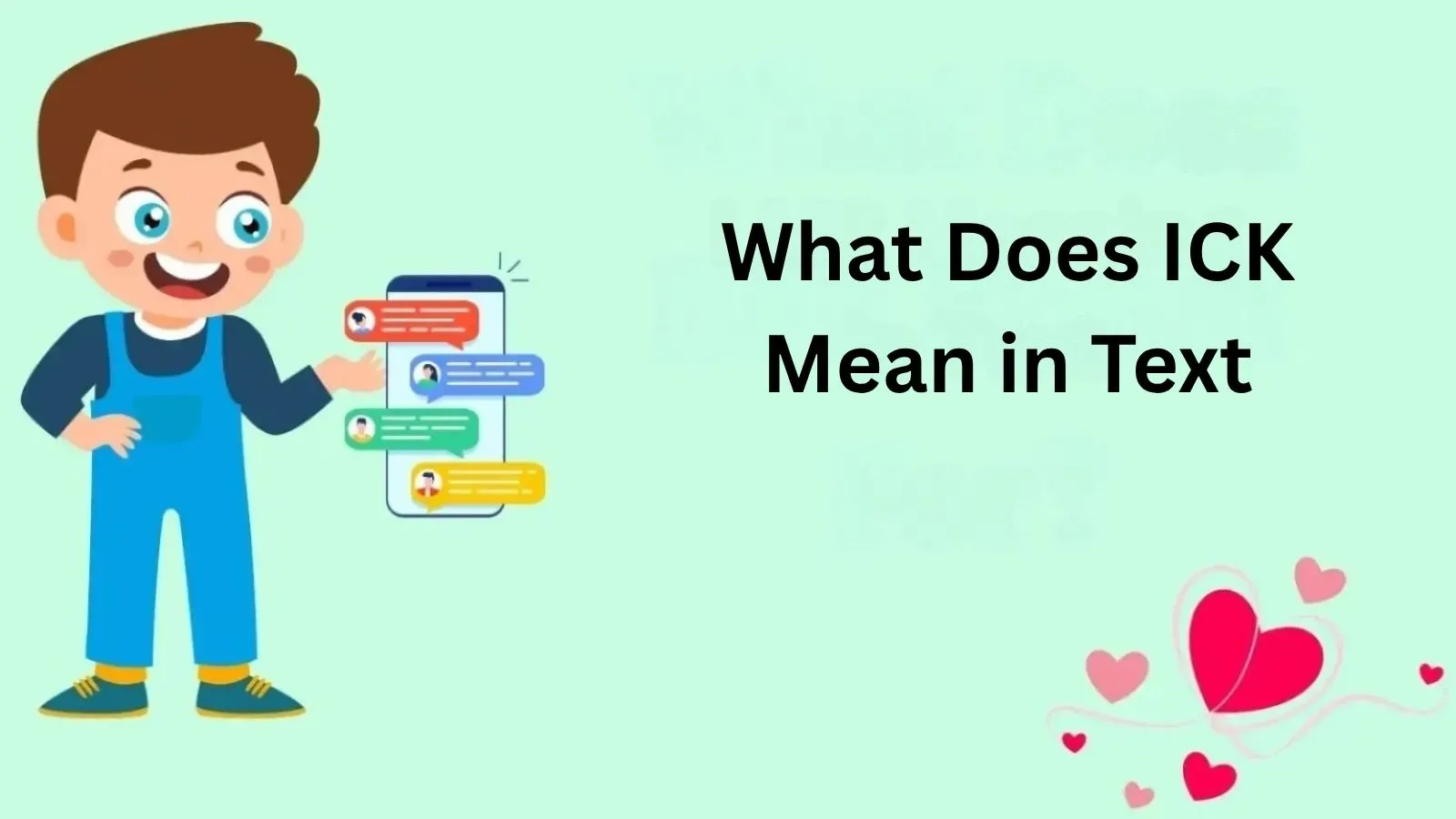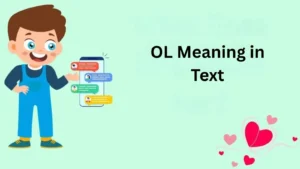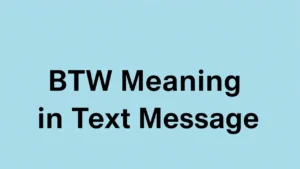Have you ever heard someone say “ick” in a text or on social media? Maybe a friend texted, “His bad breath gave me the ick!” If you’re confused, don’t worry! The term “ick” is a popular slang word used to express a sudden feeling of disgust or repulsion.
It’s common in texting, social media, gaming, and casual chats. People use it to describe something that turns them off, like a weird habit or an awkward moment. Understanding “ick” is key because it pops up everywhere—on TikTok, in group chats, or even during online gaming.
Knowing what it means helps you stay in the loop and respond naturally. This blog post will break down the meaning of “ick,” its history, and how to use it without stepping on toes. Let’s dive into why this little word packs such a big punch!
Definition & Meaning
The word “ick” describes a gut reaction of disgust or discomfort. It’s that moment when something makes you cringe or feel turned off. In texting, it’s often used to point out a behavior, trait, or situation that feels off-putting. The term is short, punchy, and captures an instant emotional response.
Key Points:
- Expresses repulsion: “Ick” signals something unpleasant, like bad manners or an awkward comment.
- Common in casual settings: You’ll see it in texts, tweets, or dating app chats.
- Not always serious: It can be playful or dramatic, depending on the tone.
Examples in Use:
- Friend 1: “He chewed with his mouth open on our date.”
Friend 2: “Eww, major ick!” - Gamer: “That guy kept spamming the chat with emojis. Total ick.”
- TikTok Comment: “His dance moves gave me the ick 😖.”
The term is versatile and often paired with “the” (as in “the ick”) to emphasize the feeling. It’s a quick way to share a reaction without explaining too much.
Background & History
The term “ick” comes from the sound people make when they’re grossed out—like saying “ew” or “ugh.” It’s an onomatopoeia, mimicking the noise of disgust.
While its exact origin is tricky to pin down, “ick” likely grew from casual speech in English-speaking countries, especially among younger people. In the 1990s, the TV show Ally McBeal popularized “the ick” to describe dating turn-offs, like bad hygiene or annoying habits. This gave the term a boost in pop culture.
Key Points:
- Evolved over time: From a general sound of disgust to a specific slang term.
- Pop culture influence: Shows like Friends and Sex and the City used it to describe dating dealbreakers.
- Social media boom: Platforms like TikTok and Twitter spread “ick” in the 2010s, especially among Gen Z.
Today, “ick” is a staple in online slang, used globally but most common in English-speaking regions like the US, UK, and Australia. It’s a go-to word for quick, relatable reactions.
Usage in Various Contexts
The term “ick” shines in casual settings. It’s used differently depending on the platform or situation. Here’s how it appears in various contexts:
Texting:
- Friend 1: “He texted me ‘k’ after I poured my heart out.”
Friend 2: “That’s such an ick. Dump him!”
Social Media (TikTok, Twitter):
- TikTok Video Caption: “When he wears socks with sandals 😬 #ick”
- Tweet: “People who clap when the plane lands give me the ick. Why??”
Gaming:
- Player 1: “That camper in the corner is giving me the ick.”
Player 2: “Lol, yeah, total noob move.”
Casual Conversations:
- Person A: “She kept interrupting everyone at the party.”
Person B: “Ugh, that’s such an ick.”
Key Points:
- Texting: Used to vent about annoying behaviors in short messages.
- Social Media: Often paired with hashtags or emojis for emphasis.
- Gaming: Describes frustrating or cringeworthy player actions.
- Conversations: A lighthearted way to share pet peeves.
The tone matters—sometimes it’s serious, sometimes it’s just for laughs.
Common Misconceptions & Clarifications
People sometimes misunderstand “ick” as just a silly word, but it carries emotional weight. Here are some common misconceptions:
Misconception 1: It’s always about dating.
- Clarification: While often used for dating turn-offs, “ick” applies to any cringe-inducing moment, like bad manners or awkward situations.
Example: “Her loud chewing at the meeting gave me the ick.”
Misconception 2: It’s always negative.
- Clarification: “Ick” can be playful or humorous, not always a serious judgment.
Example: “His dad jokes are such an ick, but I love them.”
Misconception 3: It’s rude or offensive.
- Clarification: “Ick” is usually lighthearted, but in sensitive contexts (like criticizing someone’s appearance), it can seem harsh. Context is key.
Example: Avoid saying, “Her outfit gave me the ick,” in a professional setting—it could offend.
Key Point: Always consider the audience and tone to avoid sounding judgmental.
Similar Terms & Alternatives
If you want to swap out “ick,” here are some similar terms:
- Cringe: Describes something embarrassing or awkward.
Example: “His pickup line was so cringe.” - Yuck: A stronger expression of disgust.
Example: “Yuck, he didn’t wash his hands!” - Gross: Used for something unpleasant or repulsive.
Example: “Gross, why is he double-dipping?” - Ew: A quick reaction to something off-putting.
Example: “Ew, his socks had holes!”
Comparison Table:
| Term | Meaning | Tone | Common Context |
| Ick | Sudden disgust or turn-off | Playful/Serious | Dating, texting |
| Cringe | Embarrassment or awkwardness | Lighthearted | Social media, gaming |
| Yuck | Strong disgust | Exaggerated | Casual chats |
| Gross | Unpleasant or repulsive | Strong | Everyday speech |
These alternatives work depending on the vibe you’re going for.
How to Respond to This Term
When someone uses “ick,” your response depends on the context and your relationship. Here are different styles:
Casual Response:
- Friend: “His loud snoring gave me the ick.”
You: “Haha, yeah, that’s rough!”
Funny Response:
- Friend: “She kept checking her phone mid-date. Total ick.”
You: “Yikes, was she texting her mom or her sidekick?”
Professional Response:
- Colleague: “His unprofessional email gave me the ick.”
You: “I get it. Maybe we can suggest clearer communication next time.”
Privacy-Conscious Response:
- Friend: “That guy’s creepy vibe gave me the ick.”
You: “Totally understand. Wanna change the topic?”
Key Point: Match the tone of the conversation and avoid escalating if the topic is sensitive.
Regional or Cultural Differences
“Ick” is primarily used in English-speaking countries like the US, UK, Canada, and Australia. It’s less common in non-English-speaking regions unless adopted through social media. Here’s how it varies:
US: Popular in dating and pop culture, especially on TikTok.
Example: “His pickup line gave me the ick.”
UK: Often tied to specific British slang, like describing “cheesy” behavior.
Example: “His over-the-top flirting was proper ick.”
Australia: Used playfully, often with a sarcastic tone.
Example: “Mate, his loud shirt was a total ick.”
In non-English cultures, similar terms exist:
- Spanish: “Asco” (disgust) is close but less playful.
- French: “Beurk” mimics the sound of disgust, like “ick.”
Key Point: Social media has made “ick” more global, but its tone varies by region.
Comparison with Similar Terms
Here’s a detailed comparison of “ick” with related terms:
| Term | Key Difference | Example Context |
| Ick | Specific to sudden turn-offs | Dating, texting (“His joke was an ick”) |
| Cringe | Focuses on embarrassment | Social media (“That video was cringe”) |
| Yuck | Broad disgust, often physical | Food, hygiene (“Yuck, moldy bread!”) |
| Gross | Stronger, more general repulsion | Behavior (“Gross, he spit on the floor”) |
| Ew | Quick, instinctive reaction | Casual chats (“Ew, bugs!”) |
Key Point: “Ick” is unique for its focus on subtle, instinctive turn-offs, especially in relationships.
Usage in Online Communities & Dating Apps
“Ick” is a star on platforms like Tinder, Twitter, and gaming communities. Here’s how it’s used:
Tinder/Dating Apps:
- Used to describe dealbreakers in profiles or chats.
Example: “His bio said ‘I hate dogs.’ Instant ick.” - Tip: Be kind when using “ick” in dating chats—it can sound harsh.
Twitter:
- Often in threads about pet peeves or dating horror stories.
Example: “People who DM ‘hey’ and nothing else give me the ick. #DatingStruggles” - Tip: Pair it with humor to keep the tone light.
Gaming Communities:
- Used for annoying player behaviors, like camping or trolling.
Example: “Spamming the same move? Major ick.” - Tip: Keep it playful to avoid starting arguments.
Key Point: Use “ick” sparingly online to avoid seeming overly critical.
Hidden or Offensive Meanings
“Ick” is usually harmless, but it can have unintended meanings:
Hidden Meaning: In dating, “the ick” can signal a dealbreaker, which might hurt feelings if shared carelessly.
Example: Saying “His laugh gave me the ick” could embarrass someone if overheard.
Offensive Potential: If used to mock someone’s appearance or personal traits, it can feel judgmental.
Example: Avoid “Her hairstyle is such an ick” in public—it’s too personal.
Tone and Context Matter: A playful “ick” among friends is fine, but in sensitive settings, it can seem rude. Always consider how it lands.
Key Point: Stick to lighthearted or vague uses to avoid offending anyone.
Suitability for Professional Communication
“Ick” is not suitable for formal settings. It’s too casual and emotional for emails, reports, or meetings. Using it at work could make you seem unprofessional or immature.
Alternatives for Professional Settings:
- Unpleasant: “His behavior was unpleasant during the meeting.”
- Inappropriate: “The tone of the email felt inappropriate.”
- Off-putting: “The presentation style was off-putting.”
Example:
- Instead of: “His loud chewing gave me the ick.”
- Say: “His behavior was distracting during the call.”
Key Point: Save “ick” for casual chats and use neutral terms at work.
FAQs
- What does “ick” mean in texting?
It’s a slang term for a sudden feeling of disgust or repulsion, often about a behavior or trait. - Is “ick” only used in dating?
No, it’s used for any turn-off, like bad manners, awkward moments, or annoying habits. - Can “ick” be offensive?
It’s usually playful, but it can seem rude if used to mock someone’s appearance or personal traits. - How do I respond to someone saying “ick”?
Match their tone—be funny, empathetic, or neutral, depending on the context. - Is “ick” used outside English-speaking countries?
It’s mostly English-based but spreads through social media to other cultures. - What’s the difference between “ick” and “cringe”?
“Ick” is about disgust or turn-offs; “cringe” is about embarrassment or awkwardness.
Conclusion
The term “ick” is a fun, versatile way to express a sudden turn-off or disgust in texting, social media, and casual chats. From dating dealbreakers to annoying gaming habits, it captures those cringeworthy moments we all experience.
While it’s lighthearted among friends, be cautious in sensitive or professional settings to avoid sounding harsh. By understanding its meaning, origins, and proper use, you can wield “ick” with confidence and stay in tune with today’s slang.
Whether you’re laughing at a bad date or venting about a pet peeve, “ick” is your go-to word for those instinctive reactions. So, next time something makes you cringe, just say, “That’s such an ick!” and keep the conversation flowing.



